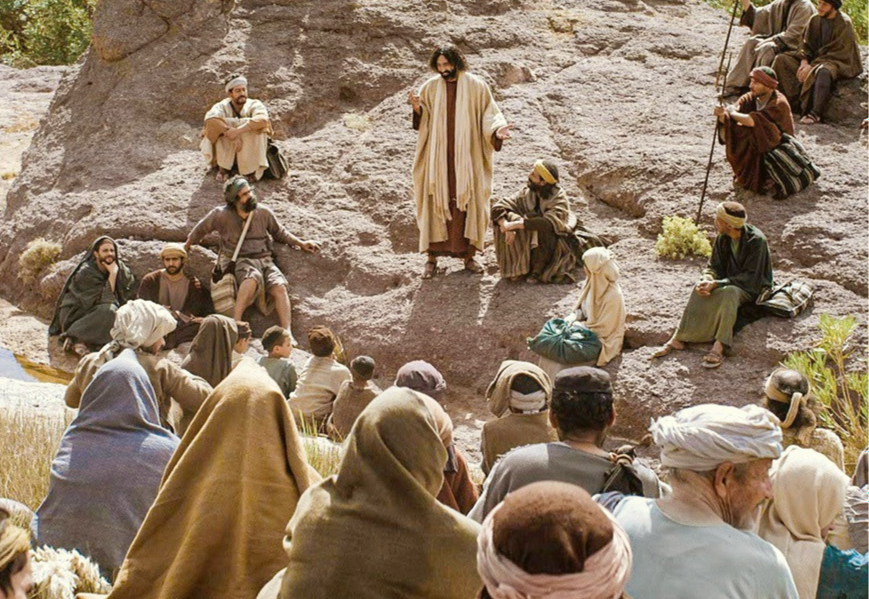
Active Learning Bible Studies
Epiphany:
Jesus, Revealed
These weekly active learning studies aim for growth in leaders and learners alike. Each onscreen study has a link beneath it to a printable version, leaving these flexible for in-person groups, remote classes, or people studying solo.

Try It!
"The LORD will watch over your coming and going both now and forevermore."
―Psalm 121:8
New Year
Photo: Noémi Macavei-Katócz on Unsplash
New Year meditation could easily center on one of many aspects of God, his relationship with us, and our relationships with our neighbors:
-
Jesus' naming and circumcision
-
resolutions: God's for us and ours for him
-
your idea?
Whichever theme your study or service centers on, let the biblical texts themselves design it. (Build the study/service from Scripture; don't create something and then jam God's word into it.)
Selecting just one Bible passage can lead to deep focus on a single phrase or word. Choosing 2+ passages often works well for a broader look at a topic the texts each discuss.
During her last year, Mom leaned on Scripture's psalms. As I step into the unknown, Psalm 121 quiets my heart and offers eternal guidance. Let's use it as an example for this exercise.
For me, this new year is a time of separation and new starts. I've been caring for my mom, a kind and godly woman of courageous honesty. The angels recently carried her home... and I'm now reshaping my earthly home.
Write an outline of an brief study based on both Psalms. Make sure to include a purposeful question leading to a significant biblical truth.
Which of the two studies you outlined better suits a New Year setting? Choose one of your two studies. Share your selected studies with each other. What did—and didn't—work well?
Study your chosen passage(s).
Psalm 121's main point is __________.
A noteworthy phrase in Psalm 121 is ____________.
This phrase matters because _____________.
Outline a brief study on Psalm 121. Include at least one purposeful question leading to an important point.

Try It!
"Magi from the east came to... worship him."
―from Matthew 2
"'Peace, peace to those far and near,' says the LORD."
―from Isaiah 57
Epiphany
Photo: Miles Peacock on Unsplash
Epiphany celebrates the Savior Jesus being revealed not only to Jews but also to the wider world.
Some churches highlight the Magi worshiping Jesus: the first recorded time that Gentiles honored him as Lord. Others emphasize Jesus' baptism: the beginning of his public ministry in the world.
This week, practice a living study:
Help remove a barrier you identified (this may simply be kindness to someone very different from you).
Be ready: memorize a simple verse proclaiming God's law and gospel.
In prayer, conversation, and life, be contrite and humble; praise God!
"'Peace, peace to those far and near.'" (Is 57:19)
"He [Christ Jesus] came and preached peace to you who were far away and peace to those who were near." (Ep 2:17)
Read Ephesians 2:11–22: who are the "far" and the "near"?
Though believing Gentiles have always belonged to spiritual Israel, this was a shocking idea to many in Jesus' day. People then and now often mistakenly focus on the earthly rather than on the spiritual.
Isaiah 57:18 depicts true Israel as "mourners" grieving their sin. Verse 15 describes them as ________ and ________. Are these descriptions of an earthly people or a spiritual people?
Do these words remind you of some famous blessings Jesus spoke?
Read Luke 6:17ff and note the Gentile fulfillment! Where was this mix of people from?
"...Not all who are descended from Israel [which meaning?] are Israel [which meaning?]. Nor because they are his descendants are they all Abraham's children. On the contrary, 'It is through Isaac that your offspring will be reckoned.' In other words, it is not the children by physical descent who are God's children, but it is the children of the promise who are regarded as Abraham's offspring."
―Romans 9:6b–8
Your congregation may well be filled with both Gentile and Jewish Christians. But Epiphany's message of salvation for all remains relevant!
In your own circle of acquaintances, who is outwardly "far away" from God? Be specific.
What barriers make it hard for them to hear and/or believe the peace that God proclaims?
Many passages teach that the deepest biblical meaning of Israel is spiritual: not a location, nor an ancestry, nor a nation. Context determines the meaning of "Israel":
1) a specific person (name),
2) outward Israel (the OT nation), and/or
3) spiritual Israel (God's kingdom of believers).
Prophecies can deliberately overlap an earthly and a spiritual fulfillment.
Note also God's "holy mountain" in verse 7... and its reappearance in 57:13b. Here, God tells us that the real Israel is whoever ______ in God.
This is in stark contrast to the outward OT nation Israel God addresses from 56:9–57:13a ("...let your collection of idols save you!") But spiritual Israel takes refuge in her Savior: the savior who in chapter 53 was "pierced for our transgressions," who justified the world and bore our iniquities. And spiritual Israel will inherit _______ land: believers' home is in _________.
Consider Isaiah 56:4–8: which kind of "Israel" is found in verse 8?
The text has clues: does it describe the blend of faithful and heathen found in the outward nation Israel? Or is this Israel filled purely with those who believe, regardless of location or ancestry?

Try It!
The church year isn't God-ordained; we can use it or not. Like all human tools, it's most effective when we learn how to wield it purposefully. This week's exercise is a high-level overview: a study in planning for spiritual growth.
Plan to Grow
Photo: Jonathan Borba on Unsplash
A church year—especially paired with a lectionary—aids in breadth of study. As Paul reminded the Ephesian elders, "I have not hesitated to proclaim to you the whole will of God."
What does Paul mean by "the whole will of God"?
(Read the points he raises in his message.)
This week's challenge:
Create—or find—a good yearlong Bible study plan.
Share plans. Discuss the pros and cons of each.
If you plan a festival season, use a gospel harmony. (Example: Epiphany was Jan 6; Transfiguration is Feb 11. Only five weeks for this harmony's B.9 to H.30: what will you focus on?) How will you use an ordinary time season? If not a church year, what study approach will you take?
Scripture isn't opposed to a faithful life of Christian love. No, Scripture reveals to us the Lord we love and his will for our lives! So we study it... with faith.
Church years ought to help people study, keep, and teach the whole will of God. The church year commonly has a "festival" half following Jesus' life from Advent to Ascension and an "ordinary time" half allowing topical flexibility. To shape a good plan for the year, try asking good questions.
What does it mean to study all of Scripture?
It means:
-
law and gospel
-
Old and New Testaments
-
all genres (history, wisdom, prophecy, letters)
-
easy and difficult books
-
familiar and new passages
-
anything else?
Which areas do I need to grow in?
Consider:
-
which passages you return to—and why
-
which Bible books you rarely open—and why
-
which genres are difficult for you to understand
-
which teachings are hard for you accept (logically, culturally, emotionally, etc.)
-
anything else?
What does my local church need?
Consider:
-
spiritual strengths and weaknesses: aim to grow!
-
controversies: resolve them with God's word!
-
our lives: lack of love, addiction, family problems, forgetting Jesus' promise to return very soon...
-
building each member to be a witness!
-
anything else?
Consider Jesus' own reliance on Scripture; how often he said, "It is written..."! Why did Christ lean on God's word when he could instead have used his divine abilities?
Also notice in Luke, Deuteronomy, Isaiah, 1 Corinthians, and James that being an "expert in the law [Scripture]" is useless without what?

Try It!
At about age thirty, Jesus began three+ years of public ministry as an itinerant rabbi. Scripture was already taught in homes, synagogues, and the temple. Why would God want Jesus to wander Israel, teaching his Father's word?
Jesus' Ministry
Photo: www.LumoProject.com on freebibleimages.org
John the Baptist prepared hearts for Jesus. Notice that John _________ Jesus as Christ (Jn 1:29–37) and that Jesus' preaching __________ as John's faded (Jn 3:22–30).
On a gospel harmony, find when John was imprisoned (around the ______ year of Jesus' ministry) and killed (around the ______ year of Jesus' ministry).
The Bible often depicts God and his work as fire:
Dt 4:24, Is 4:4, Je 23:29, Mal 3:1–4, Lk 24:32, 1Th 5:19... and more.
Jesus' ministry was "in the power of the ______." Certainly, this includes miracles (more on that next week)—but which aspect of ministry does Luke 4:15–21 emphasize? Mark 1:22? John 4:42? John 7:46?
Give an example of the Lord's word that burns in your heart with the authority of God himself: removing your impurity, refining and transforming your nature—forging you into a holy person fit for his service.
Now think of someone you know. Which word of the Lord does that person need to hear? How do you know his/her spiritual needs?
Jesus announced God's kingdom in all its holiness, power, and beauty.
He spoke:
-
blessing and condemnation;
-
hard truths and good news.
Create a short active learning study on either:
1) a single teaching of Jesus', or
2) an overview of one aspect of his teaching.
Share your studies with each other. What aspects of studies help them be fruitful?
Was Jesus' message the same as John's message?
Was it the same as the prophets' message and the apostles' message?
Is it the same as our message?
1 Peter 1:10–12 reveals the author of this single message. Who is it?

Try It!
John sent his disciples to ask, "Are you the one who is to come?" Jesus replied, "The blind receive sight, the lame walk, those who have leprosy are cleansed, the deaf hear, the dead are raised, and the good news is proclaimed to the poor."
―from Matthew 11
Jesus' Miracles
Photo:www.LumoProject.com on freebibleimages.org
Why did God anoint Jesus with divine ability to perform miracles?
(for whose benefit?)
(who is the "we"?)
(for whose benefit?)
(speaking to whom?)
(speaking to whom?)
(speaking to whom?)
(for whose benefit?)
Christ Jesus performed astonishing miracles: on people, with animals, over nature, on believers, even to unbelievers...
Name one of Jesus' miracles that amazes you.
Discuss with each other.
How did that miracle you chose bear witness to Jesus' message?
God's miracles always testify of him and his word.
-
Read in Numbers 22 about Balaam and his donkey. How did this miracle emphatically point him to God's message?
-
Read in Acts 10 about Cornelius' household visibly receiving the Holy Spirit. What truth did God know the early Church needed help believing?
So why didn't Jesus just always do miracles? ...With a snap of his fingers, fix this whole broken world?
Mark 1:45: Why hadn't Jesus wanted this?
Mark 6:5–6: Why not many here?
John 6:30: What had Jesus just done?! (look back in the chapter)
Luke 11:29: Why did he refuse—and what was the sign he gave?
Mark 15:32: Why didn't he now prove himself with a miracle?
Miracles aren't the point—miracles point. Test the message the miracles point to.
-
Matthew 7:15–23: Jesus defines "good fruit" as _________ (v 21). (Re: Jesus, see Jn 5:36! How is this like his response on the first slide?)
-
2 Thessalonians 2:7–12: What is the "breath of his mouth" with which Christ kills Satan and false prophets? (Jn 12:48)
-
Revelation 13:11–13: False religion seems Christlike, but speaks like ______ (v 11).
With a gospel harmony, consider patterns in Jesus' miracles. Create a short active learning study on one pattern. Share. Learn from each other.
-
Did Jesus' miracles change over time? With what effect(s)?
-
Were Jesus' miracles the same or different from OT miracles? With what effect(s)?
-
Why did some of Jesus' miracles include prayer?
-
Your question?

Try It!
Jesus' Example
Photo: Jacob Campbell on Unsplash
What all does Jesus here mean by "follow"?
John 12:26 layers meaning upon meaning in the simple word "follow." Read Jesus' entire statement (vv 23–28) to understand the full depth of Jesus' command... and example.
In Luke 9:51, "resolutely" is the Hebrew idiom "set his face." This calls to mind the prophetic voice of our Christ: "Because the Sovereign LORD helps me, I will not be disgraced. Therefore I have set my face like flint, and I know I will not be put to shame." Hear our Savior in Isaiah 50:4–9.
When in Jesus' life did he fulfill each prophecy in this portion of Isaiah?
Hear our Savior again proclaim his perfect life, credited to us:
...John 8:46 says his life ______ that he is God!
...John 13:15 says his life is an _________ for believers!
Discuss a few times in your Christ's life when he set a powerful example for you. How does Jesus' example help you also follow God in similar situations?
Find an example Jesus set that:
Have fellow believers been an example strengthening you in the Lord's ways? Tell them so! Build each other up.
...your church needs.
...your family needs.
...a Christian friend needs.
...you need.
Name some simple ways to store Jesus' example in your hearts. Try one method.